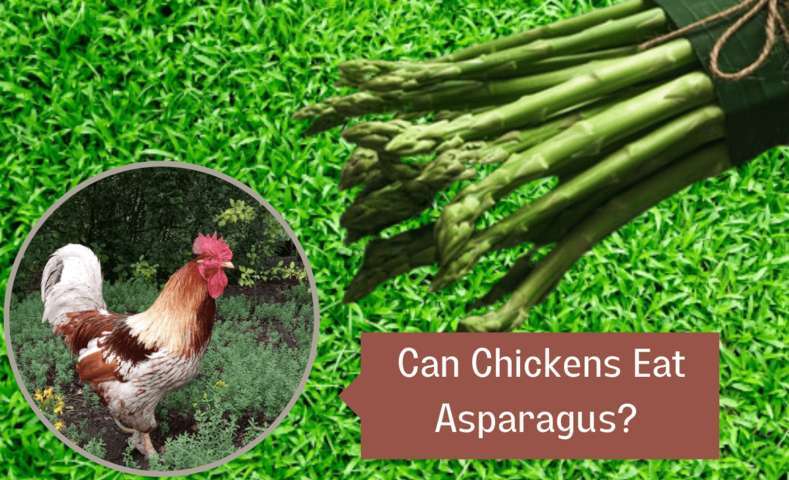Like most pets, chickens have unique dietary needs and preferences that must be considered when filling their chicken feeders. But is Asparagus a safe and nutritious food option for your chickens?
The quick answer is Asparagus is a safe and nutritious treat for your chickens. Keep reading this guide as we’ll look at the potential benefits of Asparagus for chickens and some critical tips for safely feeding it to your flock.
What exactly is Asparagus?
Asparagus is a flowering vegetable that grows in the spring. It is part of the lily family, including onions, garlic, and leeks. Asparagus has been cultivated for thousands of years and was even mentioned in the Bible.
This vegetable is present in many cuisines worldwide and is a popular ingredient in salads, soups, and stir-fries.
Varieties of Asparagus
Asparagus has varieties, the most common being green Asparagus. White Asparagus is also famous in Europe, although it is less common in the United States. Purple Asparagus is another variety that is beginning to gain popularity.
Green Asparagus
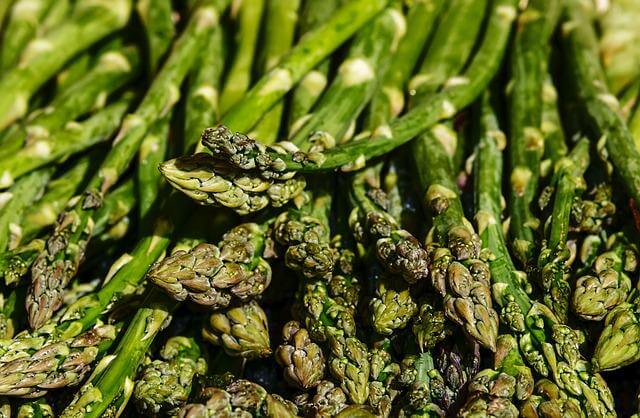
Green Asparagus is the most common type of Asparagus. Its other name is “Mary Washington,” It has a mildly sweet taste and is available throughout the year, but its peak season is spring.
Purple Asparagus
Purple Asparagus, also known as “Violette d’Argenteuil,” is a variety of Asparagus with a deep purple color. It is lower in fiber and higher in sugar than green Asparagus, giving it a slightly sweeter flavor. Many people claim it has a richer flavor and more tender texture than green-colored Asparagus, though this is mainly due to its color.
It pops up in some stores and farmer’s markets during the spring months.
White Asparagus
White Asparagus is another variety of Asparagus frequently seen on the dining tables of Europe and Asia. It is grown underground to prevent turning green and has a more delicate flavor than green Asparagus.
Also known as “Albino,” it has thick white stalks that are tender in texture. It is very similar to green-colored Asparagus in taste but is less fibrous.
The main difference between green and white Asparagus is that white-colored Asparagus is grown without exposure to sunlight, which prevents the plant from producing chlorophyll. As a result, white Asparagus is less bitter and has a more delicate flavor than chlorophyll-containing Asparagus.
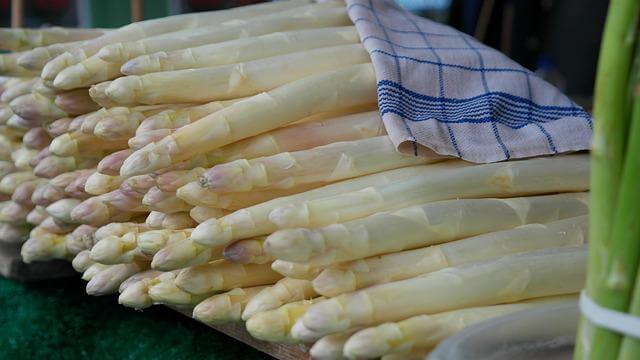
Nutritional Content
Asparagus is a highly nutritious and healthy vegetable and can provide some benefits for your chickens. Some key nutrients found in it include:
– Calcium
– Phosphorus
– B vitamins
– Antioxidants
– Protein
In addition to these nutrients, it also contains a high amount of fiber, which can help to keep your chickens’ digestive system healthy.
Why Feed Asparagus to Your Chickens? (Health Benefits)
It is one of the most nutritious foods to feed your chickens. Not only is it loaded with vitamins and minerals, but it also contains a natural amino acid called asparagine which has been shown to improve digestion in chickens.
Some other potential benefits of feeding your chickens asparagus include the following:
Excellent Source of Antioxidants
Apart from vitamin C and E, Asparagus is an excellent source of antioxidants. These antioxidants are important for chickens because they help protect the cells from damage. These antioxidants can also help to improve the immune system, making chickens less susceptible to sickness and disease.
Improve Digestive Health
Asparagus has Asparagine that improves chicken’s digestive health. This is because it helps break down food and absorb nutrients more effectively. As a result, your chickens will be able to get more out of their food and stay healthy.
Asparagus Promotes Bone Health
Asparagus is also rich in calcium, phosphorus, and other minerals important for building strong bones. So, if your hens spend a lot of time outside or start laying eggs with brittle shells, feeding them, can help prevent these issues.
Reproduction & Anti-inflammatory Properties
Asparagus also contains several chemicals and essential nutrients that may help stimulate the reproductive system in chickens. Additionally, it has anti-inflammatory properties, so it can be beneficial for older hens or those struggling with joint pain and stiffness.
Blood Regulation
Finally, this vegetable contains high amounts of B vitamins and folic acid, essential for maintaining healthy blood. So, if chickens seem to be frail or struggling with low red blood cell counts, adding this vegetable to their feed can help them improve these conditions.
Energy Production
It is also a good source of carbohydrates, which the chickens can use for energy. This is especially important if your chickens are active or need to put on weight.
Protein source
Asparagus is also a good source of protein, which is essential for the growth and repair of tissue in chickens. So, if your flock is growing or molting, feeding them Asparagus can help ensure that they stay healthy and strong.
Is Asparagus Bad for Chickens?
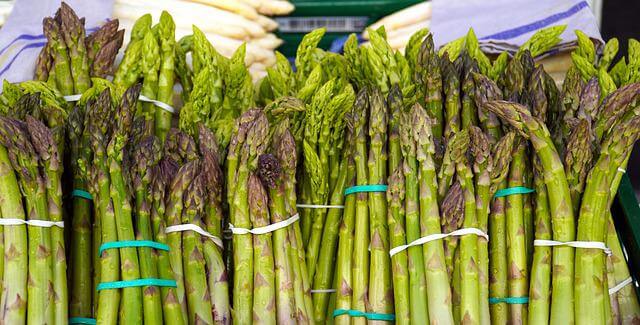
Every food is healthy in its own way, but it must be fed to chickens in moderation. Since Asparagus is high in fiber, it can cause bloating and gas if your chickens overeat it.
The first thing to remember is that it contains a compound called oxalic acid, which can bind with calcium and other minerals to form insoluble compounds. This can make it difficult for chickens to absorb these nutrients from their food, leading to deficiencies over time.
Additionally, it is a natural diuretic, which can increase the amount of urine produced. This can lead to dehydration in chickens, so it’s important to ensure they have access to plenty of fresh water.
Finally, it can also have a laxative effect on chickens, so it’s important to start with small amounts and increase gradually. This is especially true if your flock has never eaten this vegetable before.
Potential Unwanted Side Effects
Unlike poultry feed formulated explicitly for chickens, Asparagus is not a perfect food and can have some unwanted side effects. Some potential adverse effects of feeding your chickens Asparagus include:
– Dehydration
– Laxative effect
– Mineral deficiencies
If you notice any of these symptoms in your chickens after eating Asparagus, it’s best to stop feeding it to them and consult with a veterinarian.
Effects on Meat and Eggs
While Asparagus is not typically harmful to chickens, it can negatively affect their meat and eggs. For example, it contains a compound called methylmercury, which can accumulate in chicken flesh over time.
Additionally, it can affect the flavor of chicken meat and eggs. Some people say that it imparts a “beany” or “celery-like” taste to these products.
On the other hand, other chicken keepers face no such issues, and their birds enjoy Asparagus without any adverse effects. So, if you’re curious about feeding Asparagus to your chickens, it’s best to start with a small amount and see how they react.
Preparing Asparagus for Chickens
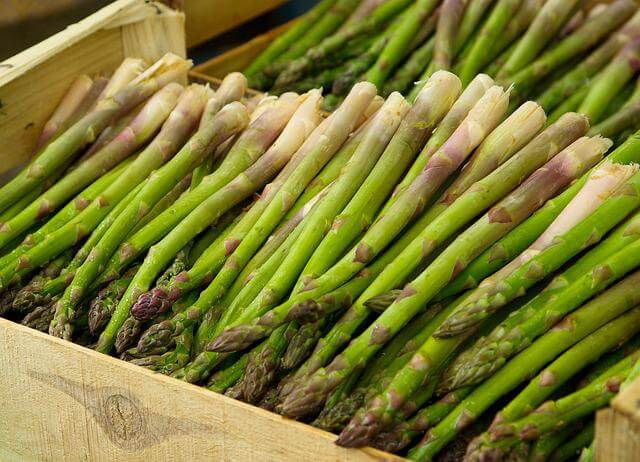
Before feeding Asparagus to your chickens, it’s important to wash it thoroughly to remove any dirt or contaminants.
You can feed your chicken Asparagus in many different ways. One option is to add fresh asparagus to their regular feed. You can then cut it into small pieces that are easy for your chicken to eat.
You can also offer it to them as a treat, either by itself or serve asparagus with fresh vegetables and mixed with other fruits.
Cooked Asparagus fresh
You can also feed chickens cooked asparagus. If you’re feeding Asparagus to young chicks, you may want to cook it first to make it easier for them to digest. However, mature chickens should be able to eat raw Asparagus without any problems.
It is healthy both in raw and cooked form.
How Do You Feed Chickens Asparagus? (Recipes for Chickens)
Chickens eat asparagus in both cooked and raw form. If you’re looking for some creative ways to incorporate it into your chickens’ diet, here are a few recipes to try:
- Asparagus and Berry Treat: This simple treat is perfect for summertime. Just mix boiled Asparagus with some chopped berries and offer it to your flock.
- Asparagus and Veggie Mash: For a more substantial meal, mix cooked Asparagus with other cooked vegetables, such as carrots, potatoes, and peas. You can then mash everything together and serve it to your chickens.
- Asparagus Soup: This soup is perfect for cold winter days. Cook it in chicken broth until tender, and then puree it until smooth. You can then add some shredded chicken and serve.
How Much Asparagus Should You Feed Chickens?
As with any new food, it’s important to slowly introduce Asparagus to your chickens to give their digestive system time to adjust. If you consider adding this green vegetable to their diet or as an occasional snack, start by offering them a small number and increasing the amount gradually over time.
You should also watch your chickens for any signs of digestive distress, such as bloating or diarrhea. If you notice these symptoms, it’s best to stop feeding them Asparagus and consult with a veterinarian.
Asparagus Growing Tips
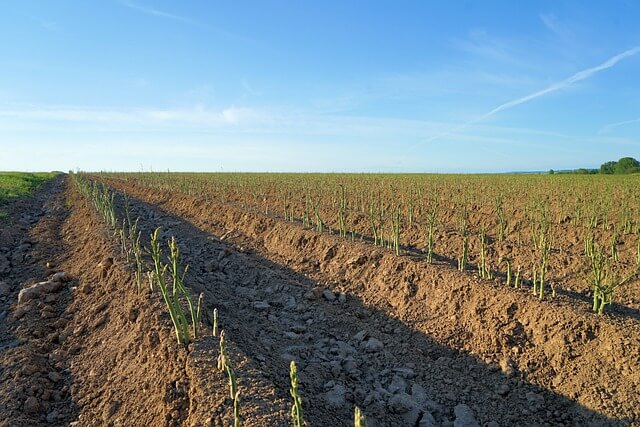
Consider a few things if you’re thinking about growing Asparagus for your chickens. First, it is a perennial plant, which means it will come back year after year.
This can be beneficial if you want to have a steady supply of Asparagus for your chickens, but it also means that you’ll need to invest some time and effort upfront.
In terms of growing conditions, Asparagus prefers full sun and warm soil. It also requires regular watering, especially during hot summer months.
Overall, if you’re looking for a nutritious treat for your chickens that comes with the added bonus of providing food year after year, Asparagus is a great option.
Keeping Asparagus Fresh
One challenge of feeding Asparagus to your chickens is that it can go wrong quickly once harvested. To keep it fresh for longer, you can store it in the fridge or freezer.
If you are storing Asparagus in the fridge, wrap it well and use it within a few days.
If you want to keep it for longer, you can blanch it and freeze it. To blanch this vegetable, simply cook it in boiling water for a few minutes before plunging it into ice water. This will stop the cooking process and help to preserve the nutrients.
You can then store the blanched Asparagus in an airtight container in the freezer for up to six months.
When ready to use it, simply thaw it in the fridge and cook it as usual.
FAQs
Does feeding your layers of Asparagus affect the taste of their eggs?
No, Asparagus will not affect the taste of your chickens’ eggs.
Can Chickens Eat Asparagus Stems?
Yes, chickens can eat asparagus stems. However, they may prefer the softer tips of the asparagus spears.
Can Chickens Eat Asparagus Berries?
Yes, chickens can eat asparagus berries. However, you should avoid feeding your chickens if they are ripe or overripe, as these may contain toxins and could be harmful to your chickens’ health.
Can baby chickens eat cooked Asparagus?
Yes, baby chickens can eat cooked Asparagus as long as they also have access to safe water. However, you should avoid feeding your baby chicken raw or undercooked Asparagus, as this may contain harmful bacteria that could make them sick. You should also monitor your baby chickens closely after introducing any added food to their diet and consult with a veterinarian if they experience any digestive issues.
Can Chickens Eat Asparagus? Final Words
As you can see, there are both good and bad sides to feeding Asparagus to chickens. While it can offer many benefits, such as increased energy and better blood flow, there are some potential downsides to be aware of. So, before you start adding this veggie to your chickens’ diet, it’s essential to do your research and decide if it’s the right choice for your flock.

